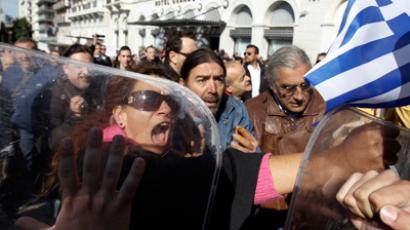Bailout doubt: Greece agrees spending cuts amid Euroworries
Greek lawmakers have agreed a last-ditch deal on the new spending cuts required to save the country from default. However, Germany is insisting the agreement does "not yet fulfil all the conditions" and thus cannot be signed.
Greek finance minister Evangelos Venizelos said Athens had reached a deal with EU and IMF officials on a "new, strong and credible program" of cuts as well as an agreement with private creditors on the "basic parameters" of a debt writedown."A few minutes ago, I got a call from the prime minister of Greece saying that an agreement had been reached and it has been endorsed by the major parties," Mario Draghi, president of the European Central Bank President, told a news conference in Frankfurt.Greece is trying to negotiate a €130 billion ($173 billion) bailout from the EU and International Monetary Fund, which, if it is agreed, will be the second such cash bailout.However, Wolfgang Schauble, Germany's finance minister, has cast doubt on the agreement, saying that a deal between Greece’s party leaders is, as he understands “not at a stage where it can be signed off.” Schauble says the conditions for the bailout include bringing Greece's debt level down to 120 per cent of GDP by 2020 for a further bailout to go ahead . But the technocrats in Brussels say even these measures will not be enough to secure the rescue plan.Greece has a total debt of about €350 billion, which is equal roughly to 160 per cent of its GDP. IMF head Christine Lagarde said the agreement in Athens was a "really positive start to the evening.”"After the very heavy duty work that has been done lately, I think it is positive," she said.No details have yet been revealed but the public have already started to voice their anger.According to police, some 10,000 people took part in the demonstrations in front of the parliament.Hundreds of protesters have clashed with police. No arrests or injuries were reported after the clashes.Greece's two major labor unions have called a 48-hour strike for Friday and Saturday against the reforms agreed on by party leaders.Greece's deputy labor minister, Yiannis Koutsoukos, has resigned to protest against the new austerity measures demanded. He issued a statement saying that he opposes the implementation of the austerity measures and reform agreed on Thursday. “I am afraid he will be followed by other members of the parties and also the government,” Greek journalist Stylianos Chrysostomidis, told RT from the square where protesters had started to gather. He says that people in the streets are calling the leadership of the coalition parties “employees of the International Monetary Fund.” They believe that the recipe for solving Greece’s financial problems which comes from the IMF "simply does not work". “It is going to fail,” thinks Chrysostomidis. “It is easier to see the sun tomorrow rising from the West than to see all these orders, all these measures bringing us growth, bringing us to normal life.”
Robert Oulds, chair of the Bruges Group think tank, told RT that the new deal might, in fact, ruin the Greek economy.
“Greece cannot survive while it is in the euro,” he said stating that most of Greece’s problems come from issues related to the euro which make its economy uncompetitive.
“Any further bailouts of Greece will only temporarily delay the reckoning, which is default and of course exiting the euro so their economy can become competitive.”














